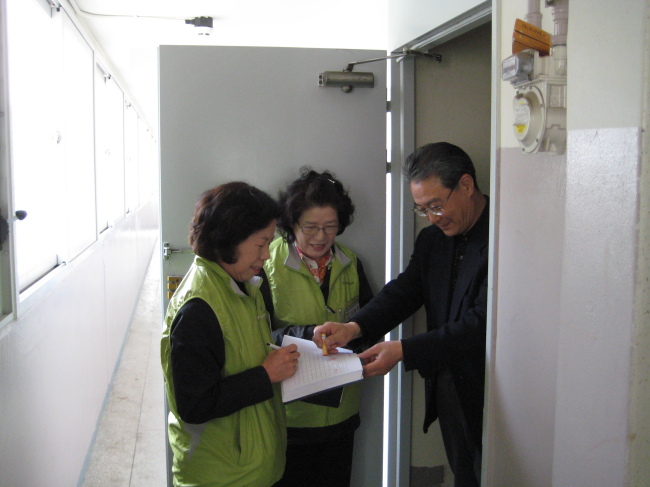LH to promote public welfare through housing know-how
Public housing developer hires senior employees to boost job opportunities
By Korea HeraldPublished : May 29, 2013 - 20:19

“The key concept of LH’s social contribution projects is to improve living conditions, especially for the low-income bracket,” said an official of the public corporation.
Since 2010, LH has been funding the establishment and operation of social enterprises within its public apartments nationwide.
The corresponding enterprises mostly produce eco-friendly products or provide day care services for senior citizens and children. The resulting profits are to be reinvested in local communities, to offer social benefits and new jobs to the residents, according to officials.
It was for this local project that former CEO Lee Ji-song won a leadership award from the Labor Ministry last year.

Lee, who had been in charge of LH since its integration in 2009, stepped down earlier this year, a gesture to give way to a successor who will lead the organization under the new Park Geun-hye administration.
“It was Lee’s belief that one of the top tasks of LH, as a leading public corporation, was to understand the residents’ demands and to respond to them in detail,” said the official.
Other examples of such social contribution projects were after-school study rooms and mentoring programs.
“A considerable part of the public facilities within LH’s rental apartments were neglected by the residents,” the official said.
By using this surplus space, the corporation CSR department started a free education program, focusing on children of one-parent families or low-income households.
“Because the entire program is integrated with the residential area, the parents or guardians would find it easier to use the given service,” the official explained.
The program not only offers compensatory learning sessions but also field trips and scholarships opportunities for students.
“A majority of the rental apartment residents belong to the socially disadvantaged class,” the official said.
“In order for them to break out of the vicious circle of poverty, they need strong momentum, which is education.”
While promoting the education of the residents’ children, LH has also been dispatching voluntary mentors to individual households, in an aim to look more closely into the local communities’ hardships.
Some 400 voluntary participants from 16 universities nationwide are currently registered in the LH headquarters for the function.
When it comes to the older age groups, LH offers job opportunities by hiring senior employees and expanding the range of its regular internship.
Last year, LH created some 190,000 new jobs by placing orders amounting to 14 trillion won ($1.2 billion), which was 45 percent of the total orders placed by all public corporations combined.
It especially drew attention with its so-called silver employee system, which became the representative legacy of the corporation since it kicked off in 2010.
Under the program, senior citizens aged 60 or older are to be hired as caretakers in the LH headquarters and its affiliated public apartments.
“The system is not just the salary and the position, but the resulting confidence and pride which really defines the employment project,” the former LH CEO said, at the appointment ceremony earlier this year.
LH also set to hire some 500 new interns within the year, a figure which doubles the minimum designated by the government, which is 244, officials said.
“Placing priority on the socially disadvantaged groups, we will allocate at least 50 percent to local residents, 5 percent to the physically disabled and 6 percent to people of national merit.”
By Bae Hyun-jung (tellme@heraldcorp.com)
-
Articles by Korea Herald


![[Grace Kao] American racism against Stray Kids](http://res.heraldm.com/phpwas/restmb_idxmake.php?idx=644&simg=/content/image/2024/05/13/20240513050827_0.jpg&u=)




![[KH Explains] Naver’s Line dilemma: Lose global footing for cash?](http://res.heraldm.com/phpwas/restmb_idxmake.php?idx=644&simg=/content/image/2024/05/14/20240514050624_0.jpg&u=)

![[Herald Interview] Carbon breakthrough in Korea: Making diamonds at atmospheric pressure](http://res.heraldm.com/phpwas/restmb_idxmake.php?idx=644&simg=/content/image/2024/05/14/20240514050559_0.jpg&u=20240514184059)

![[Graphic News] Only 34% of S. Korean elites favor nuclear arms](http://res.heraldm.com/phpwas/restmb_idxmake.php?idx=644&simg=/content/image/2024/05/13/20240513050852_0.gif&u=)







